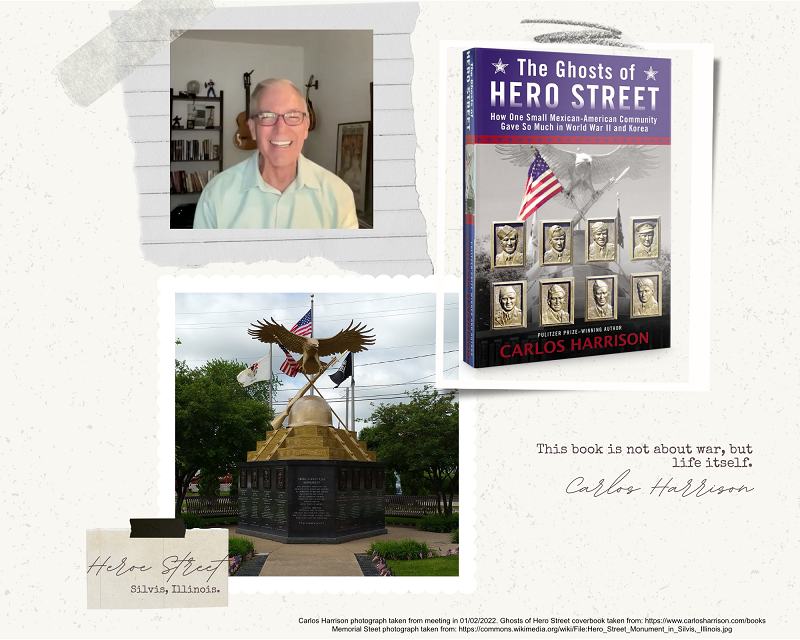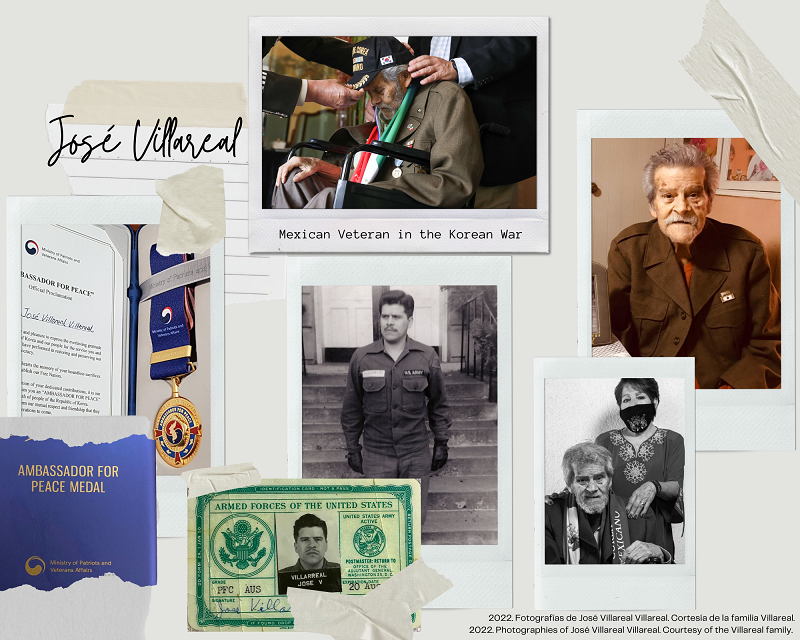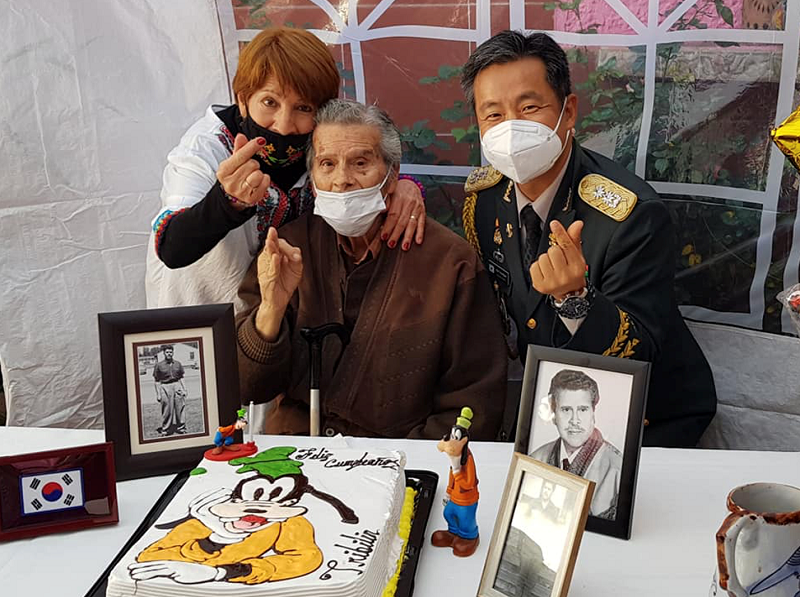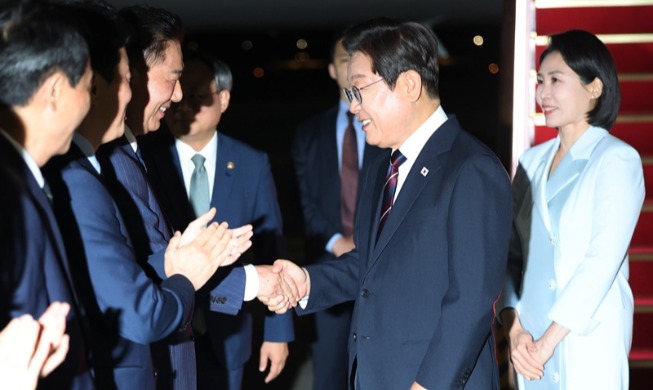- 한국어
- English
- 日本語
- 中文
- العربية
- Español
- Français
- Deutsch
- Pусский
- Tiếng Việt
- Indonesian
By Honorary Reporters Nerea Ramirez and Esly Monjaraz from Mexico
Photos = Carlos Harrison, Jose Villarreal and family, Wikimedia Commons
This year marks the 60th anniversary of diplomatic relations between Mexico and Korea.
As one of many nations that helped the Republic of Korea during the Korean War, Mexico donated food and medical supplies worth USD 350,000 at the time. Though Mexico did not formally dispatch troops, more than 100,000 Mexican and Mexican American soldiers fought in the war alongside the U.S. military under the United Nations flag, comprising 3% of American forces.
To remember the soldiers' sacrifices, the following are excerpts from interviews conducted on Feb. 1 via videoconferencing with an author and the son of a Mexican veteran on the experiences of such men in the conflict.
Author of "Ghosts of Hero Street"

Carlos Harrison's book "The Ghosts of Hero Street" was published in 2014. (Carlos Harrison)
Carlos Harrison, a Pulitzer Prize-winning journalist and Panamanian American writer, spent six years gathering information on and writing his book "Ghosts of Hero Street." The book tells the story of 22 Mexican American families in a small town in Illinois who all sent members to fight in World War II and the Korean War.
On researching for his book, Harrison said, "One challenge I went through was that there was a big fire in the record vaults in the 1970s. All U.S. military records were kept there and much paperwork was lost. I kept digging until I found the after-action and combat reports in the national archives. That's how I pieced the story together, and it was very challenging."
Another challenge in writing his book was racing against time, he said, adding, "Statistics show that around 100 World War II veterans die of old age every day. They are disappearing." The author said he relied on families who kept memories of their relatives alive and letters they saved from the soldiers.
A family central to Harrison's work was the Sandovals. Alex Sandoval helped a lot in the writing of the book, especially the chapters on his brother. Before he died, Sandoval read the chapters and was happy to know that his brother's legacy would remain.
"So this is why I do what I do. I hope that these people can live for others. I hope we can learn from their experiences," the author said.
Mexican soldier who dreamed of Korea reunified

Jose Villarreal, a Mexican who fought with the U.S. military in the Korean War, died last year at age 90. (Villarreal family)
Jose Villarreal, a U.S.-born Mexican who died last year, joined the U.S. Army to fight in the Korean War. According to his son Jose Antonio Villarreal Ugarte, the elder Villarreal landed in Korea at a port in Incheon on Sept. 15, 1950, the day after his birthday. He took part in the Incheon Landing Operation along fellow Mexican and Mexican American comrades in Battalion 546, half of whose 250 soldiers were ethnic Mexicans. He stayed in Korea for 18 months and fought in the Second Battle of Seoul.
Jose Villarreal said he had fond memories of Korea and experiences with Koreans, whom he remembered as "kind and supportive." His son said, "Koreans treated (the soldiers) very well because they saw them as liberators, and they even brought them food. My dad mentioned that they protected them when they were ambushed, taught them shortcuts, and even showed them how to use weapons and herbs on the battlefield. When he returned, Koreans sent him souvenirs and medals, and he was very grateful for that."
"I remember that (my father) wished for the two Koreas to be reunified. He would say he witnessed a destroyed country and that what Korea achieved is incredible. He thought Korea's fight for success was admirable."

Jose Villarreal (middle) celebrates his 90th birthday with his wife (left) and Korean military attache Kim Yoon-joo (right).
Life after war
Among the soldiers from 2nd Street in the Illinois town, eight were killed in battle. Those who returned were not properly recognized for their service until 1969, when their street was renamed Hero Street in their honor. They also have their own memorial in Silvis, Illinois.
After the war, Villarreal settled in Mexico City and got a job with General Motors, eventually becoming a union leader. This experience later led him to form the Korean War Veterans Association last year, bringing together veterans and their families.
His son said, "On June 25, 2020, the 70th anniversary of the outbreak of the Korean War, Mexican Ambassador to Korea Bruno Figueroa wrote about the forgotten soldiers. When I saw that article, I posted about my dad and his memories of the war on the embassy's Facebook page. The embassy immediately reached out to me and asked for a video call."
That year, Lt. Col. Kim Yoon-joo, a military attache at the Korean Embassy in Mexico, visited the Villarreal family to recognize his participation in the war. The veteran's memoirs were also published the same year under the title "I Dreamed of Being a Hero: a Chicano in the Korean War."
To mark the 60th anniversary of bilateral relations and raise public awareness of Mexico's contributions to the war, items belonging to Villarreal and other veterans will be displayed at an exhibition in Seoul.
kalhong617@korea.kr
*This article is written by a Korea.net Honorary Reporter. Our group of Honorary Reporters are from all around the world, and they share with Korea.net their love and passion for all things Korean.
